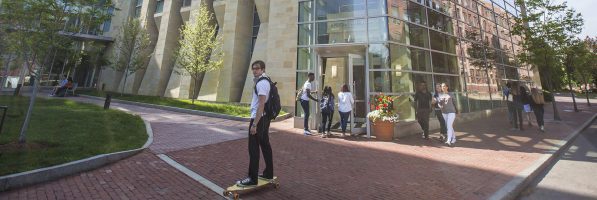The Best Energy Industry MBA Programs in the U.S.

With the current shift in global economics that coincides with climate change, business schools have seen the benefit of educating students toward a sustainable future. Whether through influencing public policy, investing wisely in carbon reduction technologies, or developing businesses that serve to adjust to global warming, MBA grads with a focus within the energy industry have limitless career prospects.
The Best Energy Industry MBA Programs in the U.S.

The University of California, Berkeley Haas School of Business‘ Bay Area location (a center for innovation in sustainability) make it a clean energy industry leader. With an interdisciplinary approach that combines engineering, public policy, and law, Berkeley Haas MBA students have access to such initiatives as Cleantech to Market (C2M). This partnership between grad students, industry professionals, and researchers offers an annual symposium presenting the newest trends in clean technologies.
In C2M, professionals in such arenas as energy generation, storage, grid technology, and water purification guide students through past solutions. Students integrate their curriculum into real world solutions with the help of these professionals and leading researchers.

Cornell’s SC Johnson Graduate School of Management also offers a wealth of opportunities in the development of sustainable solutions for MBAs with the school’s immersion program, the Center for Social Enterprise. After receiving a sizable endowment in 2002, researchers and business leaders formed the SC Johnson Professorship in Sustainable Global Enterprise. Recently ranked 2nd overall by Bloomberg Businessweek, the sustainability curriculum at Johnson has achieved wide acclaim.
In addition, Johnson offers an Environmental Finance and Impact Investing Fellowship. With projects sponsored by corporate and government entities, students receive opportunities to work with the World Bank, Barclays, and The Water Initiative to address pressing issues in development and the increasing demand to find alternative energy sources.

UNC’s Kenan Flagler Business School offers an MBA that they consider “unique among major business schools.” The program, which exhibits a marked emphasis upon ROI, focuses on the energy value chain, and the intersection of oil and gas usage, renewables, and petrochemicals.
This degree focuses primarily on training future leaders in corporate sectors, power generation, renewable energy, investing firms, and consulting firms specializing in energy.

MIT’s Sloan School of Management takes an exemplary role in leadership development for the sustainable energy industry. According to Sloan’s Sustainability Initiative, the school “empowers leaders to act so that humans and nature can thrive for generations to come.” With a mission that includes a sustainability certificate, partnerships with NGOs and government agencies, and an ongoing lecture series, MIT Sloan offers a strong foundation in cleantech development.
In a recent roundtable, experts in renewable energy supply chain discussed potential solutions. These include wind farms and solar power for underserved populations.
“When you’re inside a startup and talking to your colleagues all the time, it’s easy to lose sight of the big picture,” says Sandhya Murali, a recipient of the Sustainability Certificate. “Being able to talk with experts in the field and share ideas with veterans in the industry was extremely helpful.”
Murali, ’15, is the CEO of the Solstice Initiative, which provides solar energy to communities in every economic strata.

Finally, University of Pennsylvania’s Wharton School of Business is at the forefront of energy efficiency, offering an MBA major in Business, Energy, Environment and Sustainability. Combining a focus in tech, regulation, finance, and business modeling trends, this degree prepares MBAs for leadership roles in energy, clean-tech investment, energy banking, consulting, government, and the sustainable non-profit industry.
Courses include Energy Markets and Policy, Energy Finance, Environmental Management, Law and Policy, Social Impact Marketing and Energy Law.
In addition, there is a dual degree option for Wharton MBAs. In which, students can combine an MBA with a Master in Environmental Studies for career opportunities in energy management.
Investing In U.S. Innovation, and More – Boston News

Let’s explore some of the most interesting stories that have emerged from Boston business schools this week.
The 1 Thing Your Company Should Add To Its Retirement Benefits – MIT Sloan Newsroom
MIT Sloan Professor Lotte Bailyn took part in a three-year research study under HBS Professor of Business Administration Teresa Amabile to understand the “organizational, social, and psychological forces that can affect people’s retirement experiences.”
Bailyn outlined two strategies to help “pre- and early-retirement individuals manage their transition out of the workforce”:
- The “Phase-down” strategy enables a “retiring employee to work less while receiving a percentage of their pay, plus benefits. At the end of the phase-down — which can range from months to a handful of years —the person retires.”
- The “Contracted rehire” strategy allows companies to hire back employees on a contractual basis, which Bailyn explains, “allowed the company to get the specific niche knowledge that that person has, and by working with other people, employees in the organization could pass on that knowledge.”
Questrom School of Business Professor of Management Tim Hall, one of the researchers on the study, adds, “It’s surprising how little employing organizations are doing to help them [transition]— even though at the same time they’re interested in maybe helping people move on and opening up opportunities for younger people, they’re not. I think there’s a great opportunity cost they’re suffering by not doing that.”
You can find more information on the study here.
How the U.S. Can Rebuild Its Capacity to Innovate – Harvard Business Review
There is a growing trend of companies across all industries choosing to “invent and manufacture abroad” in what Harvard Business School’s Willy Shih describes as a loss of “industrial commons.” According to a recent Harvard Business Review article, “nearly half of the foreign R&D centers established in China now belong to U.S.-based companies.”

“Over recent decades, VCs have overwhelmingly focused on software and biotech investments over ‘hardware’ investments, closing additional doors to manufacturing innovations. It’s no wonder that so many promising manufacturing enterprises have to look abroad to simply get off the ground—let alone soar,” writes Sridhar Kota, Justin Talbot-Zorn, and Tom Mahoney.
The article recently outlines four principles the U.S. could use to reinvigorate its industrial ecosystems.
- Don’t Fear Picking Winners: “Rather than allowing promising R&D results to languish in labs or even be commercialized by foreign competitors, the U.S. should launch a National Innovation Foundation to invest in engineering and manufacturing R&D to mature emerging technologies and anchor their production onshore.”
- Invest in Hardware Startups and Scale-Ups: “U.S. policymakers can … build on existing resources to help innovative hardware startups and scale-ups succeed—particularly through domestic government procurement [the way] China has employed government procurement, strategic technology transfer, and domestic technology development to build its respected high-speed rail industry.”
- Mind the Mittelstand: Small and medium enterprises (SMMs) “amount to about 250,000 firms, or 98 percent of all manufacturing firms. By strengthening and supporting these firms, the U.S. could rebuild the backbone of its manufacturing sector.”
- Power to the People: “While American high schools typically require students to dissect a frog, few require students to disassemble a power tool. Exposure to real-world engineering is a crucial and cost-effective way to build interest in manufacturing careers—through either four-year engineering degrees or vocational training.”
You can find the entire HBR article on re-investing in American industry here.
Legacies Catching On – Carroll School News
BC Carroll School of Management Professor of Information Systems Gerald Kane recently put together a new research report as part of a gig guest editing the MIT Sloan Management Review’s Digital Business Initiative. The report, Coming of Age Digitally: Learning, Leadership, and Legacy, emphasizes the need for companies to foreground experimentation in their “digitally maturation” processes.
According to the Carroll School News, “Nimble businesses create the conditions for employees to take risks and try new things. The key to [prepare] for more digital disruption is to not simply hire but develop digital leaders.”
“Part of developing leaders means giving employees the time and space to acquire new skills, an area where many companies need to improve. Ninety percent of survey respondents said they need to update their digital skills at least yearly—and 44 percent said they need to do so ‘continually.’ Yet at ‘early-stage’ companies (which are paradoxically often the older companies), nearly 30 percent indicated that their employers offered little to no support to do so.”
You can read more about Kane’s research here.
How To Create Your Own Internship, and More – Boston News

Let’s explore some of the most interesting stories that have emerged from Boston business schools this week.
How to Land an Internship That Doesn’t Exist Yet – D’Amore-McKim Blog
The D’Amore-McKim School of Business at Northeastern University recently published an account of how Matheus Dos Santos, DMSB ’19 created his own internship at Brazilian bank branch Banco Bradesco.
Dos Santos, a Brazilian native, sought out an internship at Banco Bradesco as an opportunity to “learn more about the industry” while he spent his summer back home in between his first and second years at D’Amore-McKim.
Dos Santos reports, “When I was talking to them about a summer job, they didn’t have any process in place. They weren’t sure at first how to hire me formally, and since I’ve started, all sorts of people have come up to me to say that I’m the first one the bank has hired for this kind of position.”

AP Photo via Victor R. Caivano
Dos Santos helped Banco Bradesco “develop an online trading platform to reach millennials.” Edilson Fontenele, head of customer experience at Bradesco and Dos Santos’ supervisor, writes that Dos Santos’ appeal was his unique perspective as a “millennial who knows the Brazilian environment and also had exposure to international markets.”
You can read the full article here.
The Big Leap – Sawyer Business Blog
Sawyer Business School student Jennifer Wiens writes candidly about the precise moment she decided to transform her life and career. After being laid off from her job at a Seattle biotech company, Wiens chose to move cross-country to Boston in part to “go where the jobs were” but also because she thought Sawyer “could help me capture that sense of control in my career.”
Wiens simultaneously began her Sawyer EMBA and a stint as Charles River Labs’ global product manager where she coordinated “multiple teams and meeting with clients all around the world.” She writes about how the two fed into each other.
“Because of my Suffolk experience, I don’t feel like I’m out of my element. I’m explaining business concepts to people who’ve been in business for 20 years. I’m teaching them current approaches to certain things.”
Then Wiens pulled another 180 by leaving the Charles Rivers Lab gig. As part of her EMBA capstone course, she created a business strategy and marketing plan for Advanced Dental Sleep Medicine, which offers “alternative, non-surgical ways to reduce sleep apnea.” According to the article, both of which worked so well that the “owner convinced her to leave Charles River Labs and come work for him [as] full-time employee number three.”
Wiens writes, “The company’s gotten a lot of good buzz, so the business is poised to explode and franchise out. And that’s where I come in.”
You can check out the full article here.
3 Steps Toward Safer and Sounder Software – MIT Sloan Newsroom
Deutsche Bank CIO and head of safety and soundness Frédéric Véron recently gave a talk at the MIT Sloan CIO Symposium, where he shared 3 pieces of wisdom for making software “safe and sound.”
Véron said “safe and sound” software is about a “mix of hyper-awareness, good planning and foresight, and learning quickly from mistakes.”
According to the article, “hyper-awareness” involves knowing “how all your software is actually being used day-to-day, ensuring all stakeholders in development understand the full scope of the product, and continuously taking baseline metrics to understand what can be considered normal operating conditions for a system.”
Good planning and foresight entails that “all of the different procedures that will be necessary to maintain the system in production mode need to be thought through ahead of time. You can always bolt it all on later, but it will cost you more money and it won’t be native or work as well.”
Véron advocates “failing and adapting fast” by adopting agile and DevOps. “The whole point of agile is about adopting the philosophy where you break down major efforts into smaller efforts, allowing you to do incremental releases so that you can make a small change, and if it isn’t working you can pull it out of production quickly without impacting the whole thing.”
He elaborated, “Safety and soundness is about ‘How do we make the enterprise safer and more sound, right from the get-go?’ Not just when things happen, but before things happen.”
The full article can be found here.
MBA Job Destinations: Wolters Kluwer

The average person may not know what international information services firm Wolters Kluwer does, or even how to pronounce it But when it comes to post graduate job placement, every MBA knows (or should know) the Dutch company’s name, and its status as a top MBA recruiter. Continue reading…
What They’re Saying: Spring Break is Sadly Almost Over

While the East Coast of the U.S. is catching up with another pleasant April storm cyclone, the rest of the business school community is back at work, shedding off the sunburned skin of a spring break well had. With the end of the formal academic year drawing near, students are preparing for the home stretch.
Check out some of the things business schools around the U.S., Canada, and UK are saying about the end of spring break and what you need to know before the academic year closes out.
Spring Break is almost over. It’s time to start thinking about Summer! Register tpdayfor @BaruchCollege #summersession courses & finish your degree early! #BaruchSummer18 #BeBaruch #academicexcellence pic.twitter.com/UJWNEyy7kU
— Baruch College (@BaruchCollege) April 4, 2018
Snowy spring break! #LeBow MBA & MS students are in Romania meeting industry leaders, including @fitbit. Check our Instagram story for live updates. pic.twitter.com/anS73QiRQl
— LeBow College (@LeBow) March 26, 2018
It’s OFFICIALLY spring break! Our MBAs will be in China, Colombia, and Brazil getting a hands on #GlobalBusiness experience 🗺💼✈ pic.twitter.com/BDaPceTOCa
— Johnson at Cornell (@CornellMBA) March 31, 2018
From climbing volcanoes to discovering secrets of luxury marketing, spring break for some Questrom students was about enhancing their business acumen through cultural immersion. https://t.co/lA6oQsdOCB
— BU Questrom (@BUQuestrom) March 29, 2018
It’s extra quiet at the #RadySchool during Spring Break! We miss our students, but hope you are enjoying your break! pic.twitter.com/Kk2LaYMLk2
— Rady School (@RadySchool) March 28, 2018
New Partnerships Marry Business with Social Purpose at Oxford Saïd

Late last year the University of Oxford Saïd Business School partnered with the Global Thinkers Forum—a social purpose organization focused on accountable leadership, women’s empowerment, and youth development—to promote the annual Global Thinkers Forum Awards for Excellence. The event took place at the British Library on November 30, 2017, and celebrated recipients of the GTF Excellence in Global Leadership awards.
As part of its partnership, Oxford Saïd sent school delegates including Dr. Dina Dommet, director of student and program services; Dr. Marc Ventresca, associate professor of strategic management; and Amy Major, MBA recruitment manager. Many current MBA students, alumni, and university staff also attended.
“The work of the GTF is to build, recognize, and value global leaders in key fields—these are people who embody a breadth of vision to engage the challenges of our world and who bring a disciplined focus to support women’s leadership and new models of youth development, especially in the Middle East, the Gulf States, and Africa,” Ventresca said at an event underscoring the many deep ties between Oxford and Forum.
“GTF was incubated at Oxford, in the original academic work and action research of founder and CEO Elizabeth Filippouli,” he added in a statement. “Seven years on, it now encompasses a wide range of initiatives and partnerships in the United Kingdom and globally. The ties with the wider Oxford family are broad and deep, and each year go and grow in new directions.”
The Global Thinkers Forum brings together a diverse network of influencers and thought leaders from a wide variety of subjects and industries. Its goal is to encourage these leaders to share their visions of the future so they can effect positive change in the world around them. This year, the event’s theme was “The Trust Imperative in an Era of Uncertainty,” and one of the award recipients was Radha Basu. Basu works at iMerit.com, an AI and skill development agency in India and the United States. And during Hilary Term, he’ll be bringing his experience to Oxford Saïd as a guest lecturer.
“This event and the partnership with Global Thinkers Forum is one of the many ways our students can engage with and benefit from innovative work of our alumni,” Dommett said in the same press release.
Find out more about the recent event here.
